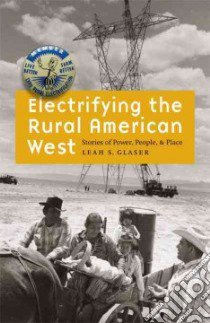Electrifying the Rural American West - 9780803222199
Un libro in lingua di Glaser Leah S. edito da Univ of Nebraska Pr, 2009
- € 53.60
- Il prezzo è variabile in funzione del cambio della valuta d’origine
Most Americans consider electricity essential to their lives, but the historic disparity of its distribution and use challenges notions of a democratic lifestyle, economy, and culture. By the beginning of the twentieth century, substations, wires, towers, and poles had followed migrants westward as the industrial era's most prominent symbols of progress and power. When private companies controlled power production, electrical transmission, and distribution without regulation, they argued that it was not “economically feasible” for many ethnic and rural communities to access “the grid.” Yet, government agents continued to advocate electrical living through federal programs that reached into and across farming communities and American Indian reservations to homogenize and assimilate them through urban technologies. In the end, however, rural electrification was a locally directed process, subject to local and regional issues, concerns, and parameters.
Electrifying the Rural American West provides a social and cultural history of rural electrification in the West. Using three case studies in Arizona, Leah S. Glaser details how, when examined from the local level, the process of electrification illustrates the impact of technology on places, economies, and lifestyles in the diverse communities and landscapes of the American West. As today's policy-makers advocate building more power lines as a tool to bring democracy to faraway places and “smart grids” to deliver renewable energy, they would do well to review the historical relationship of Americans with electronic power production, distribution, and regulation.
Informazioni bibliografiche
- Titolo del Libro in lingua: Electrifying the Rural American West
- Sottotitolo: Stories of Power, People, and Place
- Lingua: English
- Autore: Glaser Leah S.
- Editore: Univ of Nebraska Pr
- Collana: (Hardcover)
- Data di Pubblicazione: 01 Gennaio '09
- Genere: HISTORY
- Argomenti : Rural electrification West (U.S.) History Electric utilities West (U.S.) History
- Pagine: 304
- Dimensioni mm: 215 x 139 x 25
- ISBN-10: 080322219X
- EAN-13: 9780803222199


